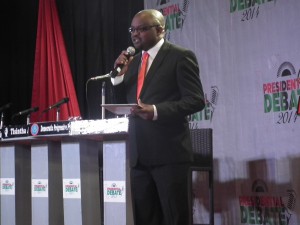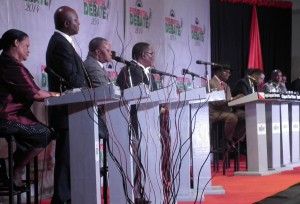FOR the first time in the country, Malawi held three Presidential Debates where Malawians got a chance to hear first-hand what presidential candidates had to say when presented with questions regarding their ideas and policies.
This added to the fact that the elections will be the first tripartite elections where Malawians will be able to vote for Presidential candidates, Parliamentary and local councillors. The Chairperson of Media Institute of Southern Africa (MISA), Anthony Kasunda “The May 2014 elections are particularly unique, as they come at a time of years of Independence”
For all three debates, the moderator, Reverend Patrick Semphere asked questions and the candidates would each get a chance to respond with their take on that particular question. The questions that were asked covered an array of topics. Some of the topics included, health care in the country and how the candidates would improve it. The economy which centred on self-sufficiency and taming donor aid. The section 65 and how the candidates if elected will deal with elected officials moving to other parties. The last topic that was asked was taxes, where one of the candidates alluded the cancelling of taxes to all the people who get less than 100 thousand kwacha per month.
The debate initially planned on accommodating 12 candidates, unfortunately some candidates did not make it to all three. Four of the candidates did not make it to the first presidential debate, but for the last two 11 candidates attended the debate leaving one candidate who was absent for all three debates. The absence of this candidate did not hinder or alter the progress of the debate. This still gave the people of Malawi a new view on the candidates and their policies.
Another key point to what made the debate a success was that the organizers were able to invite various media houses as a way to reach out to the nation on various platforms. It was aired on both television and radio. It gave the candidates a platform to reach people who do not get a chance to attend campaign rallies.
The debate is a definite win for a democratic and better Malawi which this year (2014) turns 50 years since independence. The debate reflects how far Malawi has come since 1964. It is a development that should surely continue in later elections as it helps candidates market themselves, provide voters a chance to compare the candidates side by side, and help promote political tolerance among different candidates despite their differences. Come 2019, the debates will surely be more engaging and interactive for the candidates.
@anthonykasunda “These elections are unique they come at a time of 50 years of Independence”
— Malawi Election Info (@MEIC_2014) May 6, 2014
Reporting by: Christine Malata

